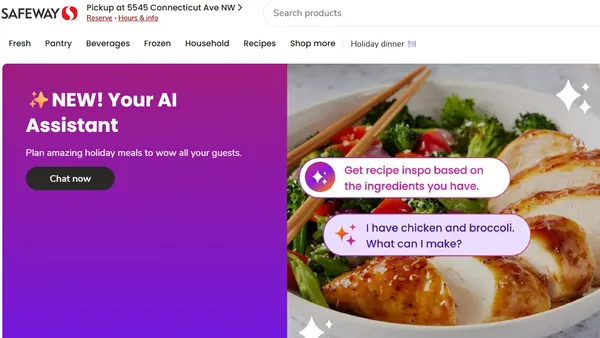Dive Brief:
- Circling back to its health-store roots, Whole Foods updated its digital product catalog, packing it with nutritional information, ingredient lists and allergen alerts for tens of thousands of products. Launched Thursday, shoppers can search by up to 13 dietary preferences including vegan, gluten- and dairy-free, sugar-conscious, and Paleo- and Keto-friendly.
- To view products, customers filter by 13 main categories, such as produce, dairy, snacks, seafood and prepared foods, most of which have sub-categories for a detailed search. In addition to dietary preferences, the tool also filters sale items and Amazon Prime member deals. For pricing, shoppers must select their state and nearest store.
- A company survey revealed that one-third of its regular customers shop based on dietary preference, according to a statement. "Whole Foods Market has always been a go-to for those who follow special diets or want greater transparency into what they are eating," said CIO Jason Buechel. This new tool makes it easier to find foods that fit dietary preferences and lifestyle changes, he added.
Dive Insight:
Whole Foods seems to be using its new product portal as a resource rather than an online store. Once a customer puts it their nearby store, the user-friendly tool creates a more localized product list that leaves room for detailed searching, including its budget-friendly private label line. The search tool puts all the 365 Everyday Value items that are also sugar-conscious, vegan and organic all in one place with a few clicks.
It's pretty handy, and will likely benefit consumers following certain diets for any reason. It could also be useful to young parents, who turn to online grocery shopping more than any other demographic currently and have children with different dietary needs.
Amazon will reportedly open more Whole Foods stores at a time when many grocers are cutting back or opting for smaller footprints, making this information-heavy tool another reason for health-conscious shoppers to shop there in person, too.
A number of grocers revamped their online product searching and ordering last year, including Albertsons, Natural Grocers, Raley's and Tops Markets, according to Progressive Grocer. Those four companies have all focused on health and wellness in some form or another, whether through improving access to information to organic and gluten-free foods or promoting small business products.
Most grocery websites offer general information about departments but typically focus on what guests will find when they arrive at the store. Of course lately, every retailer has strived to shift that approach as online ordering for delivery or curbside pick-up gains traction. Walmart, for example, highlights kosher, organic and gluten-free as categories in its online shopping portal.
A 2015 study published in Appetite found that 95% of online grocery shoppers used navigation bars to find products, while 80% also used the search tool. Whole Foods' tool feels intuitive in that sense, but its focus on detailed product information is ahead of the curve. Its listed ingredients could settle well as consumers look for more transparency when shopping. A 2015 survey by Trace One found that 68% of consumers in the U.S. said they were not provided with enough information about their food. By being transparent with their products offerings and helping ease the customer's shopping experience, Whole Foods can build trust with its consumers.









